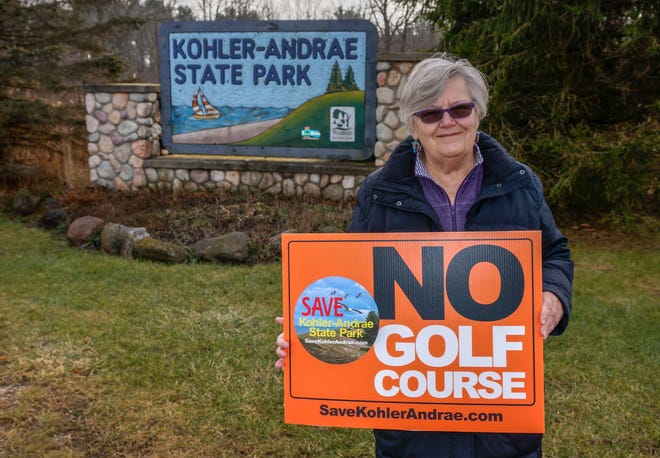Court of Appeals upholds decision denying Kohler Co. permit for golf course
Tuesday's decision was in answer to Kohler's appeal.
 Sam Bailey
Sam Bailey
SHEBOYGAN — A Wisconsin court of appeals ruled Tuesday to uphold a 2019 decision denying Kohler Co. a wetland permit to build an 18-hole golf course on Black River Forest land along the Lake Michigan shoreline.
Mary Faydash, president of Friends of the Black River Forest, a nonprofit fighting the permit issuance, said in a news release the group appreciates the judge’s decision and is “ecstatic.”
“Disrupting wetland systems has far-reaching impacts on groundwater, water bodies, hydrology and habitat,” she said. “This decision will become valuable authority for future cases.”
In January 2018, the Wisconsin Department of Natural Resources granted Kohler Company a wetland permit to build the course on a 247-acre property the company owns, including some “high to exceptional quality and globally rare” wetlands.
Kohler land swap:Conservation groups push Tony Evers to block land swap for proposed new Kohler golf course
After the permit was issued, the DNR granted a Friends of the Black River Forest petition for administrative review. In March 2019, an administrative law judge overturned permit issuance. Kohler Co. then petitioned for judicial review and the circuit court affirmed the judge’s reversal.
Tuesday’s decision was in answer to Kohler’s appeal. According to the decision, the appeal argued the administrative law judge:
- erred in considering the entire proposed project rather than focusing purely on the specific 3.7 acres of wetland Kohler planned to fill;
- incorrectly found the DNR didn’t have enough information when issuing the permit;
- made findings unsupported by substantial evidence;
- improperly reversed DNR’s decision instead of modifying the permit; and
- erred in requiring DNR and Kohler to make “quantitative findings” regarding secondary impacts of the project.
To Kohler’s first argument, the appeals court concluded state law requires DNR to consider the entirety of a proposed project when considering a wetland individual permit.
“As we will explain, this review necessarily requires the DNR to consider impacts beyond the physical footprint of directly impacted wetlands,” the decision said.
To issue a wetland individual permit, the DNR must determine whether the project will have significant, negative impacts while also considering potential secondary impacts, according to the decision.
The court also concluded substantial evidence supported the administrative law judge’s decision the DNR did not have enough information to issue the permit. Specifically, the DNR was not able to “adequately analyze” the significant, adverse environmental consequences of sections of the project.
Furthermore, the court concluded Kohler never raised an issue with the administrative law judge about the reversal of the DNR’s decision rather than modifying the permit. Therefore, the decision read, the argument the judge should have modified the permit is forfeit.
The court also found the administrative law judge did not require the DNR or Kohler to make “quantitative findings” regarding secondary impacts.
“We therefore affirm the circuit court’s order affirming the (administrative law judge’s) decision reversing the DNR’s issuance of the wetland individual permit to Kohler,” the decision said.
Proposed Kohler golf course:Kohler Co. says it built Whistling Straits to host major tournaments, but its proposed new course isn't designed for that purpose
Dirk Willis, vice president of golf, retail and landscape at Kohler Co., said they are disappointed in the court’s decision to uphold the administrative law judge’s ruling. He said the company’s intention with the golf course was for it to be an asset to the region and offer benefits to the city, including elevating the area’s reputation or being a great place to live and visit.
“We will now consider options to determine the best path forward for this project,” Willis said via email through a public relations contact. “… All along, our approach has been to enhance adjacent park facilities and to avoid, minimize, and mitigate potential impacts.”
In the expected project impacts of the DNR Wetland Rapid Assessment Methodology, the project would have multiple permanent, high significance impacts to plant life and the habitat.
“Negative impact due to fill associated with construction of a golf course and associated infrastructure … in an increasingly vulnerable wetland type,” the report stated. “The groundwater discharge zone adjacent to the upland boundary is the area with the highest plant community integrity. This is the area that is proposed to be filled.”
Have a story tip or public interest concern? Contact Sam Bailey at sgbailey@gannett.com or 573-256-9937. To stay up to date on her stories and other news, follow her on X (Twitter) @SamarahBailey.